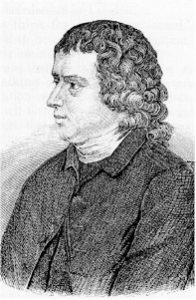


Robert Robinson
Repertoire:
Come, Thou Fount of Every Blessing
Born in England, September 27, 1735, Robert Robinson began his early education in an endowed grammar school which included the study of Greek, Hebrew, Latin, and Literature. When his father died, he was apprenticed to a barber in London but he pursued his study of the classics, neglecting his business. A life-changing event happened during his seventeenth year when he went to hear George Whitefield preach. His text was Matthew 3:7, and in describing the occasion, Robinson later wrote that “Mr. Whitefield described the Sadducean character: this did not touch me. I thought myself as good a Christian as any man in England. From this he went to that of the Pharisees. He described their exterior decency, but observed that the poison of the viper rankled in their hearts. This rather shook me. At length, in the course of his sermon, he abruptly broke off, paused for a few moments, then burst into a flood of tears, lifted up his hands and eyes, and exclaimed, ‘ Oh, my hearers, the wrath’s to come! the wrath’s to come!’ These words sank into my heart like lead in the waters. I wept, and when the sermon was ended retired alone. For days and weeks, I could think of little else. Those awful words would follow me wherever I went.” Finally, he recorded that it was on December 10, 1755, he “found full and free forgiveness through the precious blood of Jesus Christ.”
Shortly before he turned 17, Robinson was released from his apprenticeship. His employer said Robert appeared to be more interested in reading than working, and in following preachers than in attending to his customers. He became associated with the Wesleys and their work in London and began preaching in 1758. He also served as a pastor in several local churches but he had not formally separated from the Church of England. Rich relatives encouraged him to leave the Wesleys and take orders in the Established Church, but he declined. It was during this time that his personal study had raised concerns and doubts concerning infant baptism. He chose to be baptized as a believer and became a Baptist in early 1759. He was asked to preach by the Stone Yard Baptist Chapel in Cambridge (where later Robert Hall was Pastor) but did not accept their pastoral call until nearly two years later, being ordained June 11, 1761. By all accounts, his stay at Cambridge was a success. He preached at the Baptist Chapel 2 or 3 times each Sunday. Members of the University and others were regular attenders. He also had 15 other locations in the area where he would preach.
In 1790 his health failed. He died June 8 while in Birmingham, and was buried in the Old Meeting graveyard there. Robert Hall prepared his epitaph: “Sacred to the memory of the Rev. Robert Robinson, of Cambridge, the intrepid champion of liberty, civil and religious. Endowed with a genius brilliant and penetrating, united to an indefatigable Industry, his mind was richly furnished with an inexhaustible variety of knowledge, his eloquence was the delight of every assembly, and his conversation the charm of every private circle. In him the erudition of the scholar, the discrimination of the historian, and the boldness of the reformer, were united in an eminent degree with the virtues which adorn the man and the Christian. He died at Birmingham, on the 8th of June,1790, aged 54 years, and was buried near this spot.”
His one song we remember, ‘Come Thou Fount of Every Blessing’, strikes a chord in our hearts with his heart-felt plea as shown in the original words of verse five:
O to grace how great a debtor
Daily I’m constrained to be!
Let Thy goodness, like a fetter,
Bind my wandering heart to Thee.
Prone to wander, Lord, I feel it,
Prone to leave the God I love;
Here’s my heart, O take and seal it,
Seal it for Thy courts above.
Sources: Dictionary of Hymnology; John Julian 1892
Dictionary of National Biography, 1885-1900, Vol. 49, Editor: Leslie Stephens
